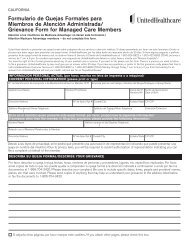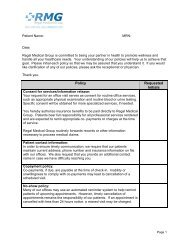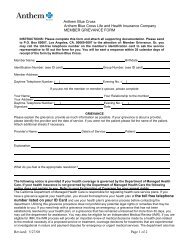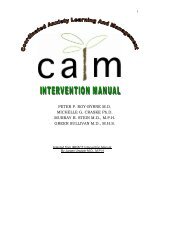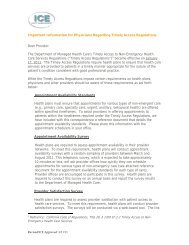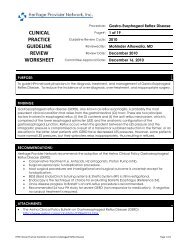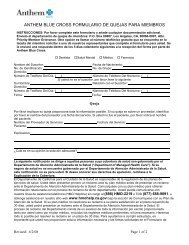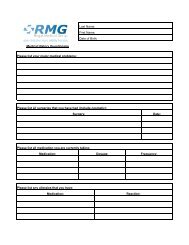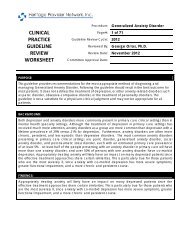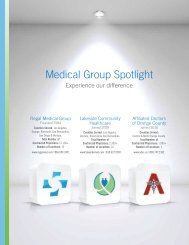Identity Theft - Regal Medical Group
Identity Theft - Regal Medical Group
Identity Theft - Regal Medical Group
Create successful ePaper yourself
Turn your PDF publications into a flip-book with our unique Google optimized e-Paper software.
<strong>Regal</strong> <strong>Medical</strong> <strong>Group</strong><br />
Red Flags Rule<br />
Identify <strong>Theft</strong> Training<br />
1<br />
RMG:Red Flags Rule
Purpose of the Red Flags Rule<br />
• To protect against identify theft.<br />
• To train the workforce on identifying,<br />
detecting, and responding to identify theft.<br />
• Penalties imposed for violations against<br />
compliance with the rule.<br />
2<br />
RMG:Red Flags Rule
Categories of Red Flags<br />
• Alerts and notifications received from consumer reporting<br />
agencies or service providers such as fraud detection<br />
services.<br />
• The presentation of suspicious documents.<br />
• The presentation of suspicious personal identify<br />
information such as a suspicious address change.<br />
• Suspicious activity related to a Covered Account.<br />
• Notice from customers, victims of identity theft, law<br />
enforcement or others regarding identify theft.<br />
3<br />
RMG:Red Flags Rule
In the Course of Caring for Patients<br />
• A complaint or question from a patient<br />
based on the patient’s receipt of:<br />
-A bill for another individual;<br />
-A bill for a product or service that the patient denies<br />
receiving;<br />
-A bill from a health care provider that the patient never<br />
patronized; or<br />
-A notice of insurance benefits (or explanation of benefits)<br />
for the health care services never received.<br />
4<br />
RMG:Red Flags Rule
Cont.<br />
In the Course of Caring for Patients<br />
• Records showing medical treatment that is inconsistent with a<br />
physical exam or medical history as reported by the patient.<br />
• A complaint or questions from a patient about receipt of a<br />
collection notice.<br />
• A patient or health insurer reports that benefits have been<br />
depleted or a lifetime cap has been reached.<br />
• A dispute from a patient who claims to be the victim of any type<br />
of identity theft.<br />
• A patient who has an insurance number but never produces an<br />
insurance card or other physical documentation of insurance.<br />
5<br />
RMG:Red Flags Rule
Cont.<br />
In the Course of Caring for Patients<br />
• The photograph on a driver’s license or other photo ID<br />
submitted by the patient does not resemble the patient.<br />
• The patient submits a driver’s license, insurance card or other<br />
identifying information that appears to be altered or forged.<br />
• An address or telephone number is discovered to be incorrect,<br />
non-existent or fictitious.<br />
• The patient’s signature does not match a signature in the<br />
practice’s records.<br />
• A notice or inquiry of an insurance fraud investigator or law<br />
enforcement, including a Medicare fraud agency.<br />
6<br />
RMG:Red Flags Rule
Protect Social Security Numbers<br />
• Do not include a SSN on mail correspondence to members (i.e.<br />
bills, referrals. Authorizations/denials).<br />
• Do not intentionally communicate or make available to the<br />
general public a member’s SSN.<br />
• Do not require a member to transmit a SSN over the internet<br />
unless secure or encrypted.<br />
7<br />
RMG:Red Flags Rule
Work to Detect Red Flags<br />
• Establishing policies & procedures to address the<br />
detection of Red Flags.<br />
• Verifying the identity of persons opening a Covered<br />
Account.<br />
• Authenticating customers, monitoring transactions<br />
and verifying the validity of information.<br />
8<br />
RMG:Red Flags Rule
Respond to Red Flags<br />
• Respond to detected Red Flags.<br />
• Contact the customer.<br />
• Change passwords to Covered Accounts.<br />
• Notify law enforcement.<br />
• Investigate and determine what if any action<br />
is necessary.<br />
9<br />
RMG:Red Flags Rule
Periodically Update Processes<br />
• Based on past experiences of identity theft.<br />
• Based on changes in identity theft methods.<br />
• Based on changes in methods to detect, prevent,<br />
and mitigate identity theft.<br />
• Based on changes in business arrangements,<br />
including mergers, acquisitions, alliances, joint<br />
ventures, and service provider arrangements.<br />
10<br />
RMG:Red Flags Rule
Penalties Imposed For Non-Compliance<br />
• The Federal Trade Commission may impose<br />
penalties of up to $2,500 per violation if a<br />
provider or business is deemed out of<br />
compliance with the Red Flags Rule.<br />
11<br />
RMG:Red Flags Rule
Responding to Red Flags<br />
• If fraudulent activity involves protected health information<br />
(PHI) covered under HIPAA then HIPAA security policies<br />
and procedures will apply to the response.<br />
• The employee should gather all documentation and report<br />
the incident to his/her immediate supervisor or designated<br />
compliance officer.<br />
• The supervisor or designated compliance officer will<br />
determine whether the activity is fraudulent or authentic<br />
and take the appropriate actions it deems necessary.<br />
12<br />
RMG:Red Flags Rule
Definitions<br />
• Account: financial institution or creditor to obtain the product or<br />
service.<br />
• <strong>Identity</strong> <strong>Theft</strong>: a fraud committed or attempted using the<br />
identifying information of another person without authority.<br />
• Red flag: A pattern, practice, or specific activity that indicates<br />
the possible existence of identity theft. http://ftc.gov/redflagsrule<br />
• Customer: a patient or person obtaining a service or product.<br />
13<br />
RMG:Red Flags Rule




